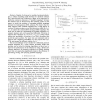Free Online Productivity Tools
i2Speak
i2Symbol
i2OCR
iTex2Img
iWeb2Print
iWeb2Shot
i2Type
iPdf2Split
iPdf2Merge
i2Bopomofo
i2Arabic
i2Style
i2Image
i2PDF
iLatex2Rtf
Sci2ools
115
Voted
ICDE
2010
IEEE
2010
IEEE
Managing Uncertainty of XML Schema Matching
Abstract-- Despite of advances in machine learning technologies, a schema matching result between two database schemas (e.g., those derived from COMA++) is likely to be imprecise. In particular, numerous instances of "possible mappings" between the schemas may be derived from the matching result. In this paper, we study the problem of managing possible mappings between two heterogeneous XML schemas. We observe that for XML schemas, their possible mappings have a high degree of overlap. We hence propose a novel data structure, called the block tree, to capture the commonalities among possible mappings. The block tree is useful for representing the possible mappings in a compact manner, and can be generated efficiently. Moreover, it supports the evaluation of probabilistic twig query (PTQ), which returns the probability of portions of an XML document that match the query pattern. For users who are interested only in answers with k-highest probabilities, we also propose the top-...
Related Content
| Added | 20 Dec 2009 |
| Updated | 03 Jan 2010 |
| Type | Conference |
| Year | 2010 |
| Where | ICDE |
| Authors | Reynold Cheng, Jian Gong, David W. Cheung |
Comments (0)

